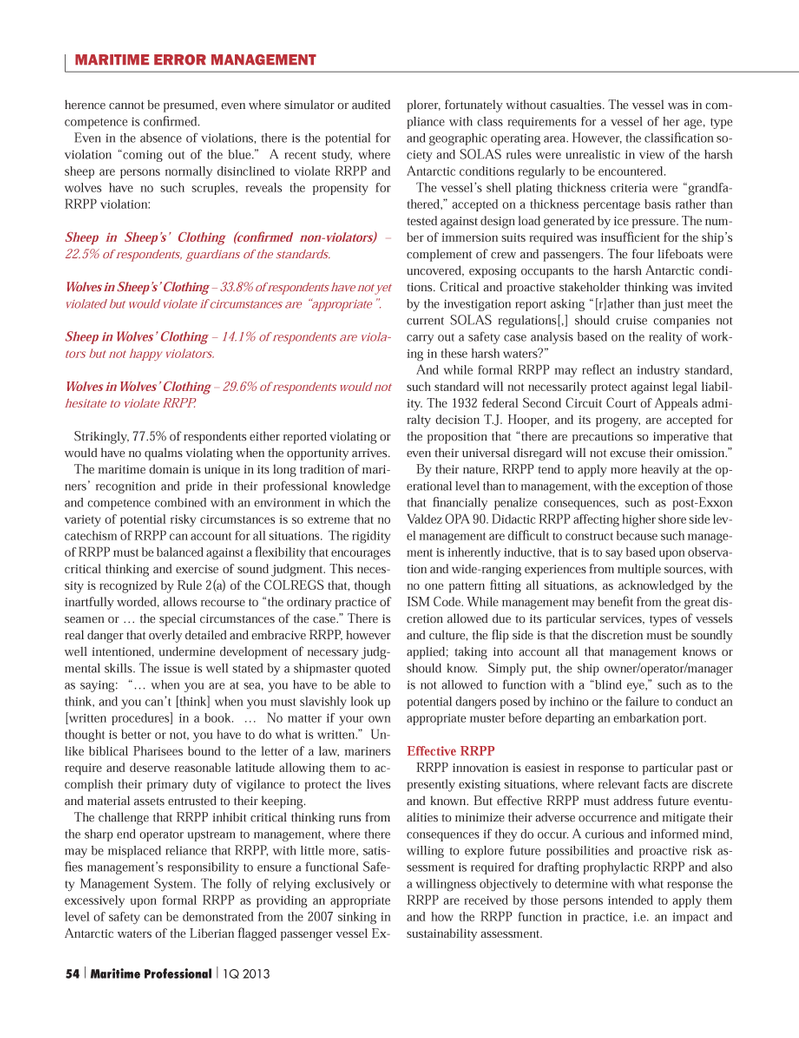
Page 54: of Maritime Logistics Professional Magazine (Q1 2013)
Maritime Risk
Read this page in Pdf, Flash or Html5 edition of Q1 2013 Maritime Logistics Professional Magazine
MARITIME ERROR MANAGEMENT herence cannot be presumed, even where simulator or audited competence is conÞ rmed.Even in the absence of violations, there is the potential for violation Òcoming out of the blue.Ó A recent study, where sheep are persons normally disinclined to violate RRPP and wolves have no such scruples, reveals the propensity for RRPP violation:Sheep in Sheep?s? Clothing (con rmed non-violators) ? 22.5% of respondents, guardians of the standards. Wolves in Sheep?s? Clothing ? 33.8% of respondents have not yet violated but would violate if circumstances are ?appropriate?. Sheep in Wolves? Clothing ? 14.1% of respondents are viola- tors but not happy violators. Wolves in Wolves? Clothing ? 29.6% of respondents would not hesitate to violate RRPP. Strikingly, 77.5% of respondents either reported violating or would have no qualms violating when the opportunity arrives. The maritime domain is unique in its long tradition of mari-nersÕ recognition and pride in their professional knowledge and competence combined with an environment in which the variety of potential risky circumstances is so extreme that no catechism of RRPP can account for all situations. The rigidity of RRPP must be balanced against a ß exibility that encourages critical thinking and exercise of sound judgment. This neces- sity is recognized by Rule 2(a) of the COLREGS that, though inartfully worded, allows recourse to Òthe ordinary practice of seamen or É the special circumstances of the case.Ó There is real danger that overly detailed and embracive RRPP, however well intentioned, undermine development of necessary judg- mental skills. The issue is well stated by a shipmaster quoted as saying: ÒÉ when you are at sea, you have to be able to think, and you canÕt [think] when you must slavishly look up [written procedures] in a book. É No matter if your own thought is better or not, you have to do what is written.Ó Un- like biblical Pharisees bound to the letter of a law, mariners require and deserve reasonable latitude allowing them to ac- complish their primary duty of vigilance to protect the lives and material assets entrusted to their keeping. The challenge that RRPP inhibit critical thinking runs from the sharp end operator upstream to management, where there may be misplaced reliance that RRPP, with little more, satis- Þ es managementÕs responsibility to ensure a functional Safe- ty Management System. The folly of relying exclusively or excessively upon formal RRPP as providing an appropriate level of safety can be demonstrated from the 2007 sinking in Antarctic waters of the Liberian ß agged passenger vessel Ex- plorer, fortunately without casualties. The vessel was in com- pliance with class requirements for a vessel of her age, type and geographic operating area. However, the classiÞ cation so- ciety and SOLAS rules were unrealistic in view of the harsh Antarctic conditions regularly to be encountered. The vesselÕs shell plating thickness criteria were Ògrandfa- thered,Ó accepted on a thickness percentage basis rather than tested against design load generated by ice pressure. The num- ber of immersion suits required was insufÞ cient for the shipÕs complement of crew and passengers. The four lifeboats were uncovered, exposing occupants to the harsh Antarctic condi- tions. Critical and proactive stakeholder thinking was invited by the investigation report asking Ò[r]ather than just meet the current SOLAS regulations[,] should cruise companies not carry out a safety case analysis based on the reality of work- ing in these harsh waters?Ó And while formal RRPP may reß ect an industry standard, such standard will not necessarily protect against legal liabil- ity. The 1932 federal Second Circuit Court of Appeals admi- ralty decision T.J. Hooper, and its progeny, are accepted for the proposition that Òthere are precautions so imperative that even their universal disregard will not excuse their omission.Ó By their nature, RRPP tend to apply more heavily at the op- erational level than to management, with the exception of those that Þ nancially penalize consequences, such as post-Exxon Valdez OPA 90. Didactic RRPP affecting higher shore side lev- el management are difÞ cult to construct because such manage- ment is inherently inductive, that is to say based upon observa- tion and wide-ranging experiences from multiple sources, with no one pattern Þ tting all situations, as acknowledged by the ISM Code. While management may beneÞ t from the great dis- cretion allowed due to its particular services, types of vessels and culture, the ß ip side is that the discretion must be soundly applied; taking into account all that management knows or should know. Simply put, the ship owner/operator/manager is not allowed to function with a Òblind eye,Ó such as to the potential dangers posed by inchino or the failure to conduct an appropriate muster before departing an embarkation port.Effective RRPP RRPP innovation is easiest in response to particular past or presently existing situations, where relevant facts are discrete and known. But effective RRPP must address future eventu- alities to minimize their adverse occurrence and mitigate their consequences if they do occur. A curious and informed mind, willing to explore future possibilities and proactive risk as- sessment is required for drafting prophylactic RRPP and also a willingness objectively to determine with what response the RRPP are received by those persons intended to apply them and how the RRPP function in practice, i.e. an impact and sustainability assessment.54 | Maritime Professional | 1Q 2013MP #4 50-63.indd 54MP #4 50-63.indd 542/25/2013 9:58:19 AM2/25/2013 9:58:19 AM

 53
53

 55
55
